#carved armoire
Explore tagged Tumblr posts
Text
The Truth About Distressed or Rustic Furniture
Distressed or rustic furniture is a popular design choice for many people because of its unique and timeless aesthetic. These types of furniture are intentionally made to look weathered and aged, and they often improve in appearance with time and use. Here’s the truth about distressed or rustic furniture and how it evolves over time: Visit Our Online Store:-ETSY MOGULGALLERY Aged Appearance:…
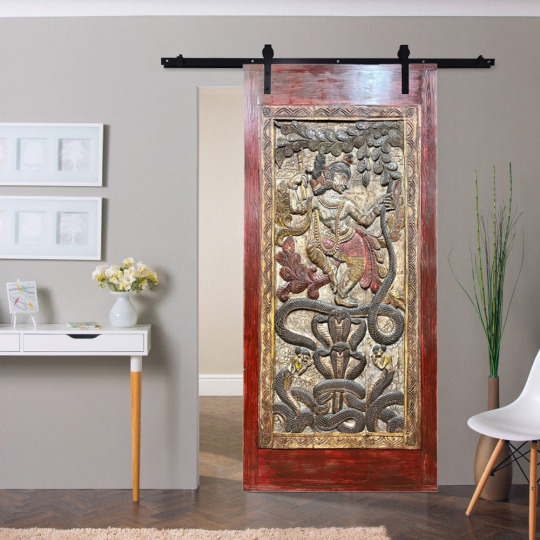
View On WordPress
#accent furniture#accent mirror#antique armoire#antique indian#bedroom cabinet#boho chic#boho mirror#carved armoire#carved mirror#carved wood#colorful console#country cabinet#entryway table#farmhouse cabinet#handmade#indian mirror#interior designer#living room armoire#reclaimed wood#rustic carved#rustic credenza#rustic farmhouse#rustic wall mirror#Spanish style#storage armoire#Tall rustic cabinets#unique eclectic#Vintage cabinets#vintage sideboard#wall mirror
2 notes
·
View notes
Text
Discover the perfect armoire for your home by exploring the collection at https://www.mogulinterior.com/. Each piece is a masterpiece, ready to infuse your living spaces with rustic luxury and historical elegance.
0 notes
Photo

Bedroom Master in Chicago Inspiration for a medium-sized Victorian master bedroom renovation with a brown carpet and no fireplace.
#carved wood armoire#ornate#crown molding#armoires#wood night stand#traditional#bedroom wooden furniture
0 notes
Text

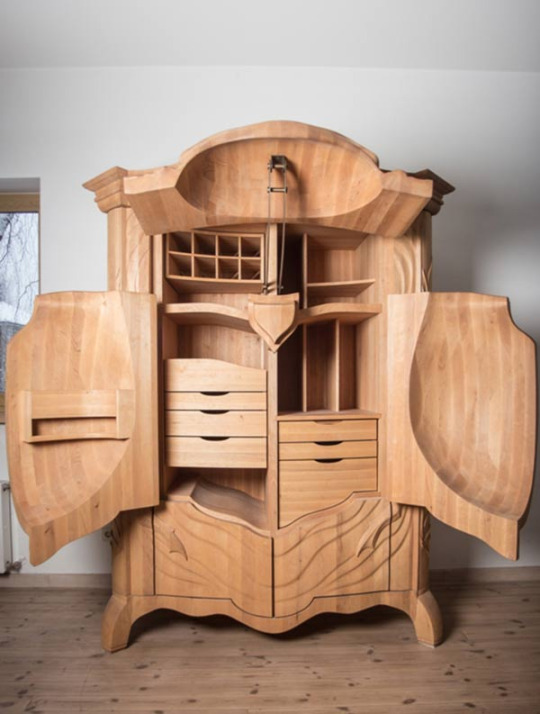
Carved beetle armoire.
yankodesign.com
7K notes
·
View notes
Text

oyster shells
Suguru dies, Satoru doesn’t, and you are coping extremely poorly.
wc — 1.3k
tags — minors do not interact, widowed reader

The two of you are too young to be getting married, so you sneak out of campus to elope at the nearest courthouse. Suguru almost asked Satoru to come, you almost asked Iori. In the end, you decided it was better this way, just the two of you.
It was what most would’ve called a shotgun wedding, too quick and over almost immediately. It was what you wanted.
Suguru splits a beer that he bought by sweet talking the cashier out of ID-ing him and a slice of convenience store cake with you. The rings are cheap aluminum, the stones plastic. It was all he could afford.
You kiss the band and slip it on your finger, and then you kiss the boy. This moment, in the cold and still night, is yours forever. You dream about it for years after, your beautiful, dead Suguru. The way his eyes shone in the fluorescent lights, so dark you couldn’t see the depths. You would just keep falling and falling.
He kisses you back, cradling your head in his hands like you’re something precious. He tastes like cheap beer and a sweetness that makes your teeth ache. This is what reminds you of him when he’s gone. 12 am cake and the bitterness of failed dreams.
When you are sixteen, you dare to believe that you are something more than what the world has assigned you. You still think you are the heroes, and you can escape your fate.
You’re right. You are the heroes. But that’s who fate loves to toy with the most.
Yaga doesn’t bother to scold you when you come back to campus with the signed documents and the promise rings that Suguru will never end up replacing. He’s not your father, he says.
He says the same thing when he’s awkwardly stroking your back as you heave over the toilet. You would think it’s morning sickness except you and Suguru never managed to have sex before he died. It’s only mourning sickness, not a baby in you but grief.
You thought you would have more time. Enough for all of it, the two story house he promised he’d build for you. Brick by brick, using his own hands. He wanted to be that man for you, someone who’d give you anything you wanted.
He used to be a sweet boy. He’d come up with baby names between forehead kisses in the mornings, syllables whispered between pecks on the temple. He was too old to be so young, already caught up in all the ways he’d be a good father.
It wasn’t fair.
When he died, Yaga cleaned out his room. His face was solemn when he found it, a rictus mask when he gave it to you. A tiny wood carving of an armoire, the draft of something Suguru would’ve made for you. The two story cottage and the small patch of vegetables that would never be.
You rush to the bathroom again. Uncomfortably, Ieiri makes a joke about immaculate conception. Yaga tells her roughly not to do it again. In between hot and cold flashes, you have a fever dream of two little girls with Suguru’s dark eyes.
Guiltily, you wish it was Satoru.
It wasn’t fair. It shouldn’t have been anyone, but if it was going to be any of you, it should’ve been Satoru.
He was too reckless. The six eyes made him believe he was capable of anything. He was the messiah of the Jujutsu world, if anyone had to be sacrificed on the pyre of their hypocritical ideals, it should’ve been him.
He was born to balance the scales, to make things right.
Suguru’s only duty was to love you.
None of it made sense. Now you are a young widow with a ring that scratched every time you put your hand down.
When Kento abandons the Jujutsu world, he asks you if you want to come with him. He doesn’t understand when you tell him no.
Suguru hated the Jujutsu world, but it’s all you have left of him. At least here, you still have memories of him sitting in the courtyard, the wind in his hair. His ghost still haunts the cafeteria. His smell lingers in your room. Hair pomade, the cologne his father bought him. Years worth of something lived in.
If you go with Kento, you’ll lose him again.
So you stay with Ieiri, living off Yaga’s kindness because you’re useless and refuse to do anything. Why get yourself killed for higher ups that sent Suguru to die? Why do anything at all?
You think it was doomed from the beginning. The only way to have survived would to have been born outside of all of this.
You couldn’t have saved him, but you wanted to try.
The anniversary of his death, Satoru shows up at your door. He’s drunk and looking for a fight. You take the beer bottle from his hand and smash it over his head.
Then he’s wet and sticky and still looking for a fight, so he kisses you. You push him away and he staggers back. You ball your hands in his shirt and drag him down, angling your head the way you would’ve kissed Suguru.
He doesn’t kiss like Suguru. He does taste like him. They drink the same shitty beer.
Now you understand why he’s drinking. Satoru doesn’t like alcohol. You had always thought they had to have kissed at some point - too many dirty jokes between them for the alternative.
You don’t want him, you want Suguru, but if you close your eyes - he still doesn’t feel like Suguru. Disgusted, you push him away, go to the kitchen, and fix him a glass of water.
Friendship between sorcerers is a serious thing. It has to be when working with another sorcerer is the same as asking to risk your lives together. It’s a unique strain of trust that can’t be found anywhere else.
You don’t like Satoru very much, not even when Suguru was alive and you were forced to coexist with him, but you don’t need to like him for your relationship to work. You can think he’s annoying and wish he was dead instead of your husband and still need him to be sitting here, in your kitchen, drinking water out of your cups.
You don’t know why he came, but you’re grateful he did, even if some part of you wants to chase him away. Part of you even loves him a little for it.
You don’t even know if he did it on purpose. Maybe he came being drawn by the same indecipherable motives that guide you. Maybe he had no plan at all.
When he finishes the glass, you get up to refill it for him. He catches your hand in his when you reach for it. You’re hovering over him, uncertain. His eyes are so blue.
His mouth closes over your fingers. You perceive the hot wetness of it first, then the loss. He opens his mouth. Sparkling on the flat of his tongue, your sad aluminum wedding band lies like a pearl against muscle, trapped in a gleaming white shell.
You kick him in fury. “Give it back.”
“I won’t fuck you with it on,” he says.
“You should’ve asked.”
He never would have, you know.
Sex with Satoru is okay. He’s pretty good. You cry a few times when he’s finally inside you. More gently than you expect him to, he brushes away your tears with the pads of his fingers. You try not to think about your ring, sitting on the nightstand. When he makes you cum, it makes you feel weightless.
“I’m not taking the couch,” he says in the stillness after. You’re both lying on your backs, facing the ceiling.
That’s fine. If he’s not leaving, then you burrow in closer, your head resting in his chest. You can feel the thud of his heart, a bit slower now, but still pounding furiously to keep up with his exertion.
He runs a hand through your hair. If you both close your eyes, you can imagine someone else there, wrapped around the two of you.

107 notes
·
View notes
Text
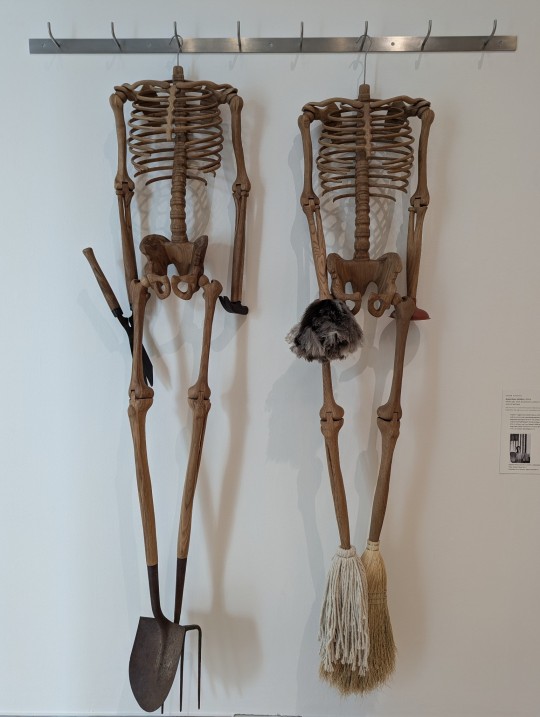
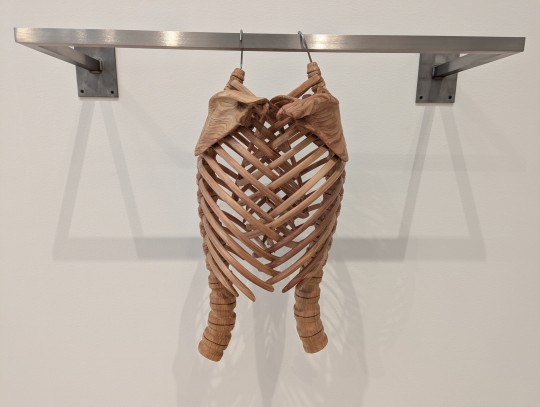
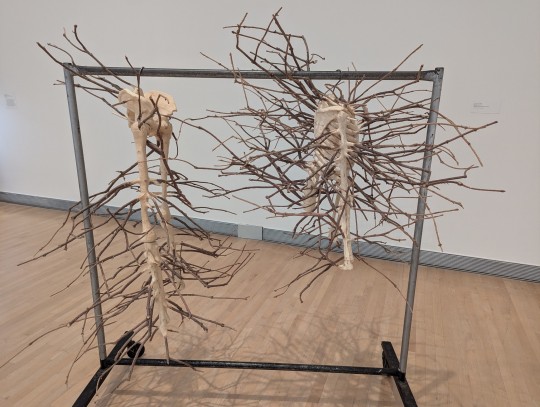
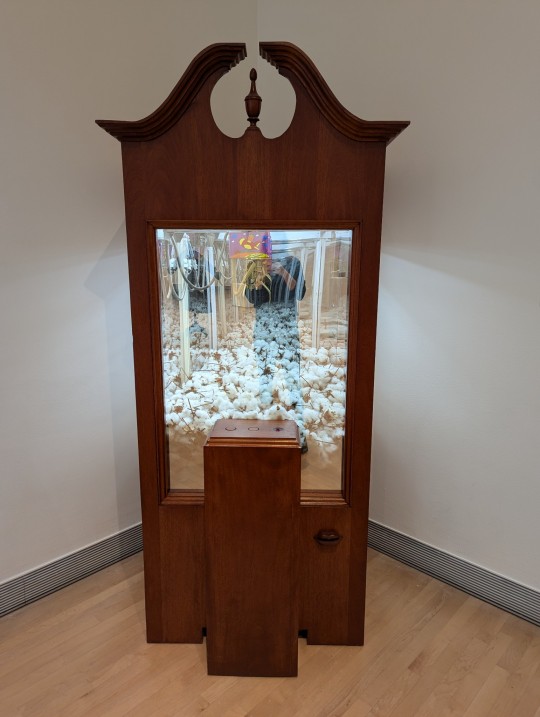
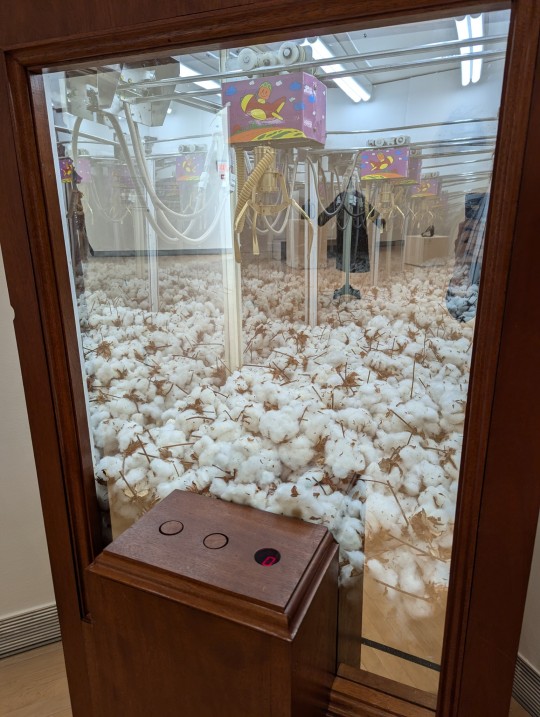
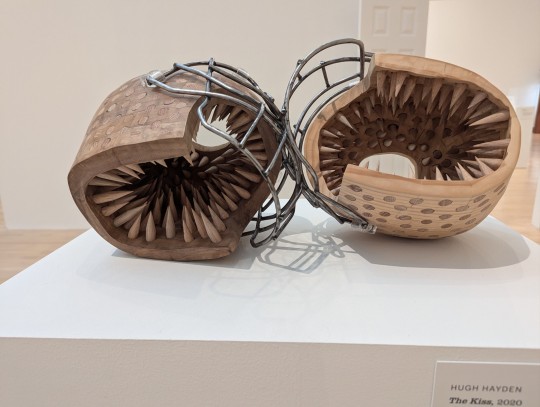
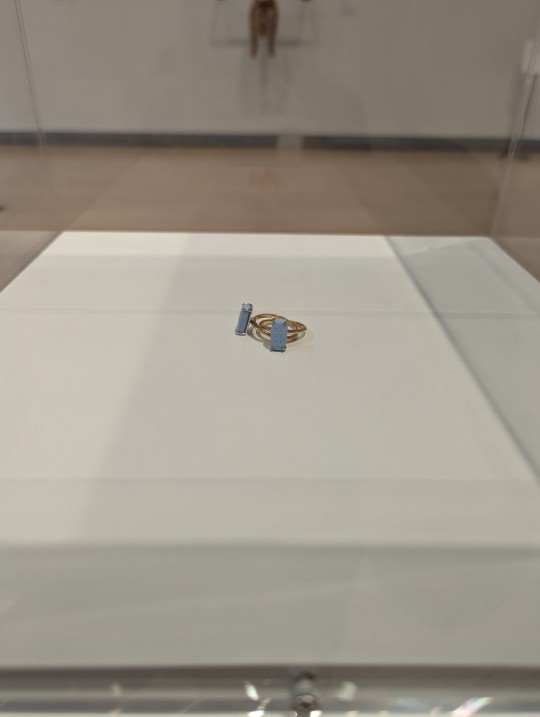
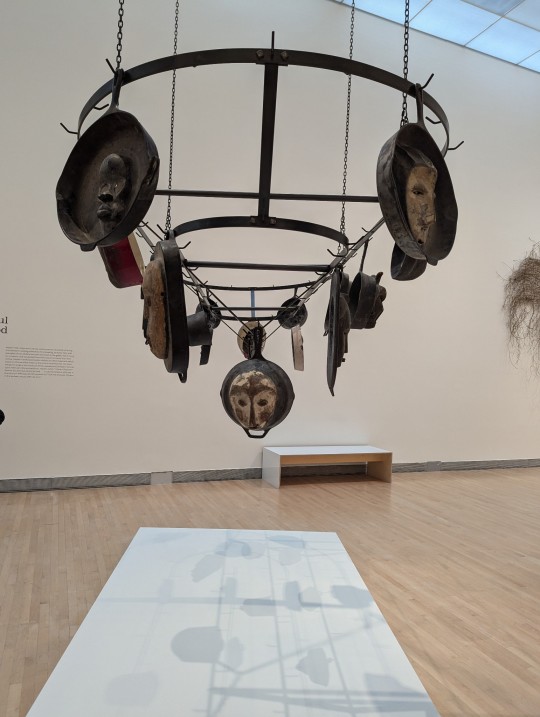
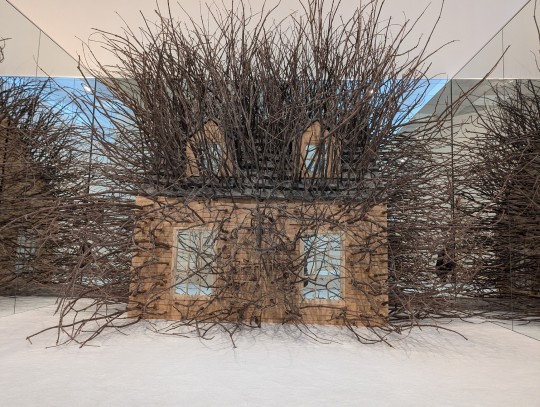
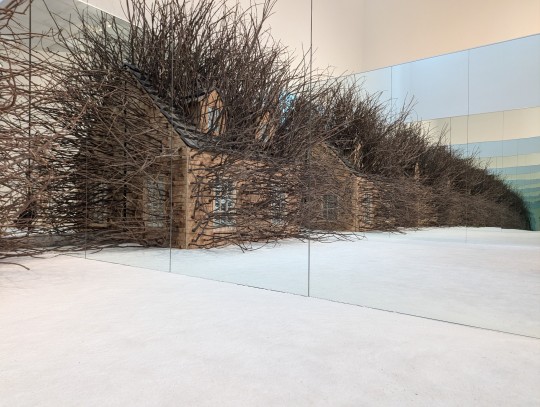
Photos of Hugh Hayden's Exhibition Home Work, as seen at the Rose Art Museum (Brandeis University), 2024. Throughout this post, text present in the gallery (written by museum curators, not me) is intended in block quotes.
Through his prodigious studio practice, Hugh Hayden (b. 1983, Dallas, TX) has become one of the leading artists of his generation. His meticulously crafted sculptures, hybrid forms, and poignant installations evoke profound reflections on the human condition within a complex, volatile, and often threatening world. hayden combines a probing analysis of serious and often painful topics with humor, visual puns, and wordplay, provoking a unique blend of visceral and critical responses.
I was captivated by Hayden's work from the moment I stepped into the gallery. Really stunning stuff. Names of all pieces in this post (left to right, top to bottom), as well as excerpts from gallery text, can be found below the Read More. I highly encourage you to check it out in more detail!
American Gothic (2024)
Hayden merges two skeletal figures with agricultural and domestic tools, examining aspects pertaining to labor and the dignity of work. The artist deliberately positions himself as part of a genealogy of American artists, referencing Grant Wood's 1930 painting American Gothic and Gordon Parks's 1942 photograph, American Gothic.
Eden (2022)
Eden presents two ribcages locked together in an intimate embrace. Hanging on a clothes rack, the ribcages are meticulously crafted from cedar wood, a material often used where clothes are stored to repel moths. The fact that the skeletal lovers are closeted suggests that this embrace needs to be kept a secret. The title references the bliss associated with the biblical Garden of Eden.
Hangers (2018)
High Cotton (2015-2020)
High Cotton, emulating and arcade claw machine, is clad in lustrous, Chippendale-inspired Honduran mahogany, carved to the recall the eighteenth- and nineteenth-century furnishings of high society. Sharp-edged cotton balls (replacing the game's expected toys) force a player to "pick cotton," a task directly associated with slavery. The work highlights the raw material used to produce the fine cotton clothing found around the world--and once neatly folded inside the mahogany armoires of slave owners.
Fairy Tale (2023)
Fairy Tale features a pair of interlocking Tiffany rings, with HIV-prevention medication replacing the expected diamonds or gems. The title suggests a "happily-ever-after" gay love story for those who once lived in the shadow of AIDS. The word "fairy" in the title, sometimes used as a slur, is here reclaimed with pride.
The Kiss (2020)
In The Kiss, two football helmets are caught together like stags whose horns are locked in battle. Their interlocking forms and the title of the piece suggest a range of relationships, from homosocial camaraderie to same-sex intimacy. Many of Hayden's sports-related sculptures expose the fact that the very devices supposed to protect may also wound. The Kiss recalls the high number of brain injuries suffered by football players.
Positives (2019-2024)
Hedges (2019)
This installation features a model of an archetypal suburban home. Rather than associating the domestic with security, Hayden transforms the familiar abode into an unsettling place where menacing branches sprout from and overpower the structure's walls, window, and roof. Hedges is experienced within a mirrored chamber that situates the viewer amid an endless row of uncanny houses. Hayden often notes that home ownership is considered one of the key goals of achieving the American dream. Yet this path is hardly assured for many people, given the inequities in society and the financial precarity that so many endure. As shown here and throughout the exhibition, Hayden's visceral sculptures reveal the disquieting contradictions of the American dream.
38 notes
·
View notes
Text
This song goes out to all my Vreenak lovers. 🎤
Kinktober Masterlist
Taglist: @horta-in-charge [because it's Vreenak, I'm also tagging @deepspacedukat, @starrynightgardens, @sleepycat82, @bigblissandlove1, @vreenak]
Day 25: Impact Play/Spanking - Vreenak x Fem!Reader
Warnings: NSFW, 18+ only, por favor; spanking; paddles | Words: ~405 | Song: Horns - Bryce Fox

The crack of his palm on your ass rang across the spacious room, your cry following it like an echo. You rocked on your hands and knees a bit, the sting flaring over your skin for a moment before Vreenak’s palm came to rest where he’d made impact, gently massaging his handiwork. There was sure to be a red handprint flowering on your ass.
When you’d come from your family home in Gav'ros Trel to Ki Baratan to serve as Vreenak’s secretary, you’d hardly imagined that this would be part of your duties. But the Senator seemed to take a liking to your sharp wit and no-bullshit attitude; you challenged him, and if there’s one thing you’d learned about him, it was that he liked a challenge.
From his place kneeling behind you, Vreenak’s free hand traced up your spine before clasping around your throat.
“I know you can be louder than that,” he murmured, his hard lok pressing against the cleft of your ass as he leaned slightly over you. A flood of arousal crested at your core, more evidence of Vreenak’s handiwork dripping between your thighs.
“Surely,” you replied, trying to sound confident, but your voice was hoarse from the evening’s activities. “But what would your neighbors think?”
“I couldn’t care less what they think,” Vreenak responded. He chuckled darkly. “But I’d imagine they think I’m taking very good care of you.” He punctuated his words with a squeeze to the sides of your neck and you couldn’t help the moan that tumbled from between your lips.
It was cut short, though, and transformed into a wail as Vreenak’s palm came down on the other side of your ass. Your arms shook with the effort of holding yourself up and, if not for fear of punishment, you would certainly have collapsed onto the bed. You’d been at this for a while, after all. And Vreenak was just getting warmed up.
You almost tipped over as Vreenak suddenly rose from the bed, stepping languidly over to an armoire in the corner of the room. As he opened the mirrored door, you glimpsed the object of his search: a beautiful and slightly intimidating paddle carved from the wood of a tree that had stood on Vreenak’s property for almost a century. He picked it up almost reverently, tapping it hard against his palm as he stalked back toward you, the snap sending a shiver down your spine.
#star trek#star trek ds9#star trek deep space nine#st: ds9#star trek fanfiction#deep space nine#senator vreenak#vreenak x reader#senator vreenak x reader#senator vreenak x fem!reader#vreenak x fem!reader#romulans star trek#romulan x reader#kinktober#kinktober 2024
27 notes
·
View notes
Text
Create Serene Bedroom Spaces with Vintage Elegance
Transform your bedroom into a peaceful retreat filled with timeless beauty and vintage charm. At Mogul Interior, we offer a curated selection of handcrafted furniture and décor that blends serene functionality with exquisite craftsmanship. From intricately carved headboards to antique wardrobes, each piece adds a soulful touch to your sanctuary. Signature Pieces for a Serene BedroomVintage…
#accent furniture#accent table#antique armoire#antique armoires#Antique Doors#antique indian#antique table#barndoors#bedroom cabinet#blue table#buddha statues#cabinets#carved armoire#carved doors#carved table#chests#console#console table#custom doors#eclectic furniture#Entryway#Floral table#garden sculptures#hall table#hand carved#handmade#handmade furniture#indian furniture#living room armoire#meditation room
0 notes
Text
Purchase Mogul Interior's Vintage Armoires and Cabinets
Step into a world where the past meets the present with Mogul Interior's exquisite collection of vintage armoires and cabinets. Each piece is a journey through time, meticulously crafted to capture the essence of bygone eras. From the ornate carvings to the rich patina of reclaimed wood, these timeless treasures from Mogul Interior are more than furniture—they are a testament to craftsmanship, history, and the art of living beautifully. Elevate your space with the allure of vintage charm; indulge in Mogul Interior's legacy of sophistication.

#vintage armoires#ornate armoires#antique carved cabinet#rustic armoires and carved cabinets#vintage armoires and cabinets#rustic antique armoire
0 notes
Text
AU Levi Ackerman: Regency Era
Summary:
In Regency-era England, Viscount Levi Ackerman finds himself in need of a wife, he is known for his military prowess but lacking in social graces, relies on Eliza, a witty but impoverished noblewoman, seeks to restore her family's dwindling fortunes and social standing uses Levi's title and connections to elevate her status, charm and etiquette to establish their place in high society. Despite their initial indifference, the couple presents a united front to the outside world. As they settle into their new roles, Levi notices discrepancies in the estate's finances. They begin to uncover a web of deceit involving embezzlement within their household. Their investigation brings them closer, forcing them to rely on each other's strengths. While still attending all the balls and tea parties.
The carriage jolted to a stop, and Eliza steeled herself. This was not the life she had envisioned, but it was the one duty her family had trusted upon her. As the footman opened the door, she caught sight of a dark figure standing at the top of the stairs. She stared at the imposing façade of Ackerman Manor, her new home, and felt her heart sink. The grand estate, with its weathered stone and towering spires, seemed as cold and unwelcoming as its master, Viscount Levi Ackerman—her husband of precisely six hours.
“My lady,” he said, his voice as crisp as his appearance. “Welcome to the Ackerman Manor.”
Eliza curtsied. “My lord. I thank you for your welcome.”
“I trust your journey was comfortable?”
“Quite,” Eliza lied. In truth, every mile had felt like a step towards her imprisonment.
Levi nodded curtly. “Harrison will show you to your chambers. I expect you’ll wish to rest before dinner.” Without waiting for a response, he turned on his heel and strode back into the house.
A throat cleared beside her. “This way, if you please, my lady,” said an older man—Harrison, she presumed. As Eliza followed the butler into the manor, she couldn’t shake the feeling of being watched. She glanced over her shoulder to find a cluster of servants quickly averting their gazes. Turning back, she stepped inside a room and her breath caught at the sight before her. The room was spacious, easily twice the size of her bedroom at home. A large four-poster bed dominated one wall, its hangings a deep blue. Ornate furniture crafted from dark wood gleamed in the fading daylight, streaming through tall windows. As Harrison excused himself, Eliza slowly moved further into the room. Her footsteps echoed slightly, and she realized why—the room was largely empty. She approached a beautifully carved armoire and hesitantly opened its doors.
Empty.
Not a single garment hung inside. Frowning, she moved to the dressing table. Its surface was bare, devoid of any personal items. The drawers, when she checked, were equally vacant. Then it dawned on her, no one had ever lived in this room. It bore no trace of a previous occupant, no hint of use or wear. This was to be her room—and hers alone. She had expected to share chambers with her new husband, as was customary. The fact that Levi had given her a separate room spoke volumes about his expectations for their marriage. She wasn’t sure whether to feel relieved or insulted. As she continued to wonder around the room, a writing desk stood in one corner, its surface bare, save for a single sheet of cream-colored paper and an inkwell. Curious, she approached it. Up close, she noticed the paper bore the Ackerman family crest. A message was written beneath it:
“Lady Ackerman, I trust you will find your chambers satisfactory.
Should you require anything, inform Harrison or your maid. Dinner is served promptly at eight .
Viscount Ackerman”
#attack on titan#levi aot#levi fluff#levi x reader#captain levi#fanfic#levi ackerman#aot levi#levi attack on titan#levi x y/n#regency romance#regency au#regency rp
21 notes
·
View notes
Text

This 1928 Spanish Revival in Long Beach, CA has so many wonderful retro features that are preserved. 3bds, 2ba, $1.02M.

Small foyer with a fancy carved arch and sconces sculpted into the wall. I've never seen anything like that.
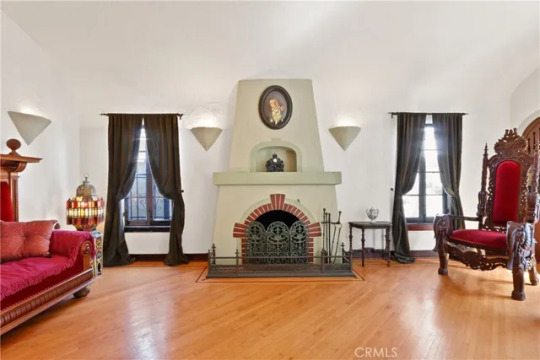
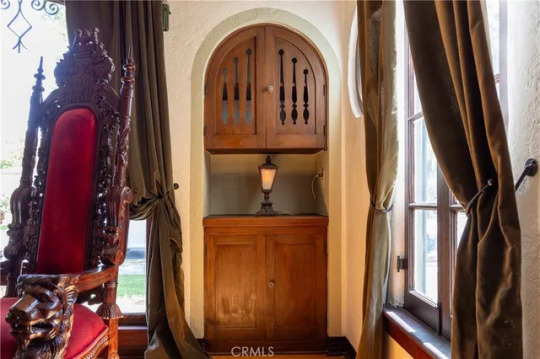
But, look, there're more. Beautiful Spanish style fireplace and a recessed built-in bar.
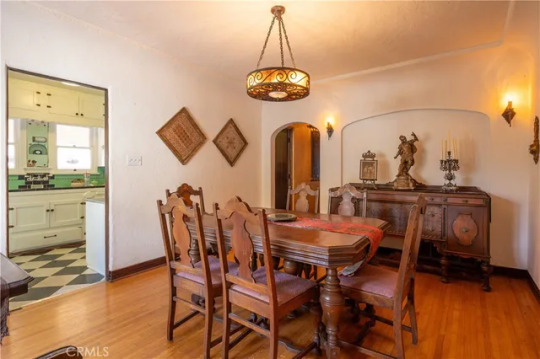
The dining room has a shallow recessed wall niche that's just big enough to highlight a sideboard.
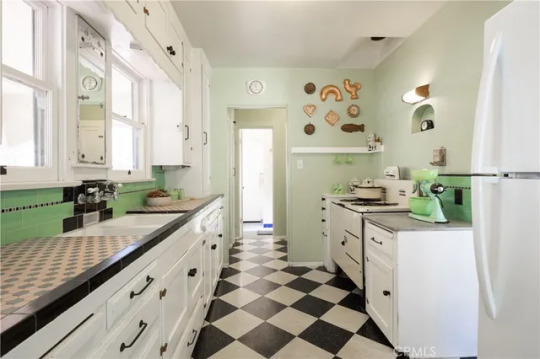
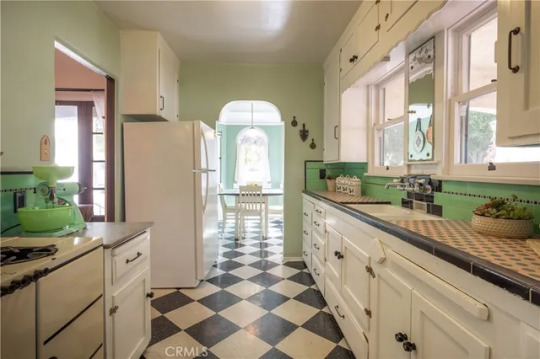
Check out this wonderful original kitchen. Vintage stove, cabinets, tile, everything. I have to appreciate how the owners took such good care of it.
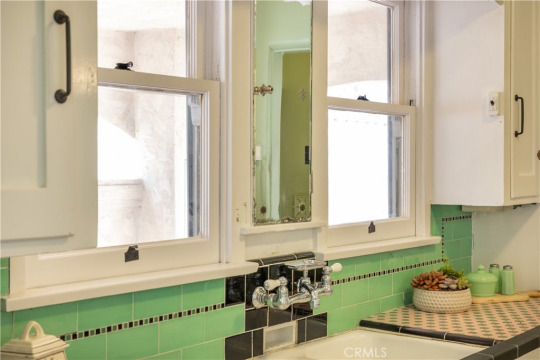
Original backsplash and faucet.
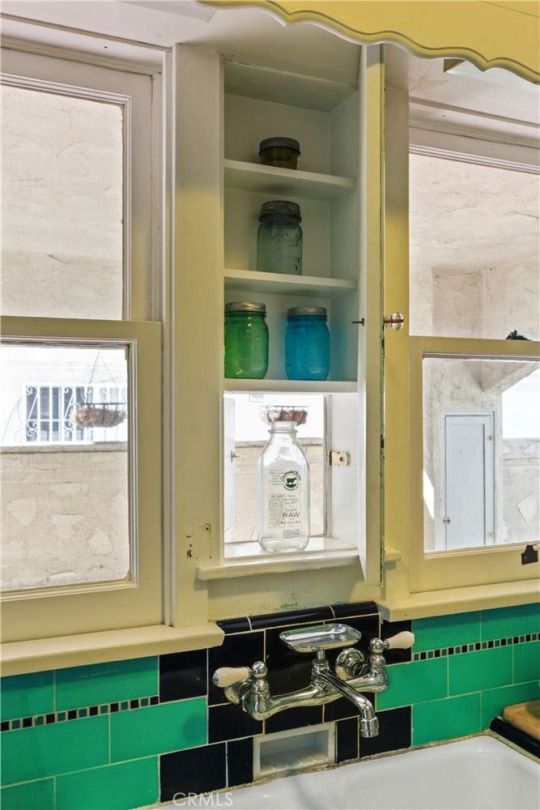
The mirrored door opens to the old milk delivery window. They must've put that little plastic shelf in the wall for steel wool soap pads (when everyone knows that you simply put them back in the box and they're good as new).
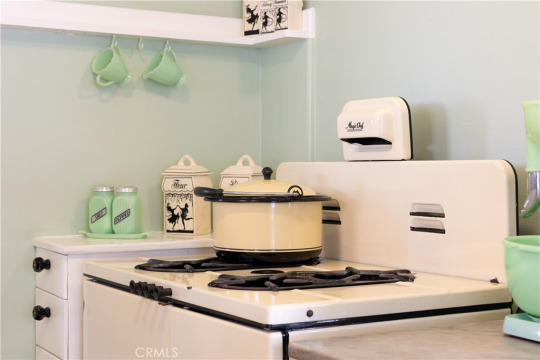
Wonderful vintage stove.
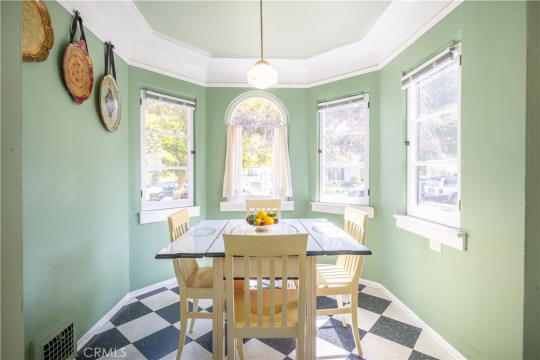
What a lovely, sunny kitchen dining space.
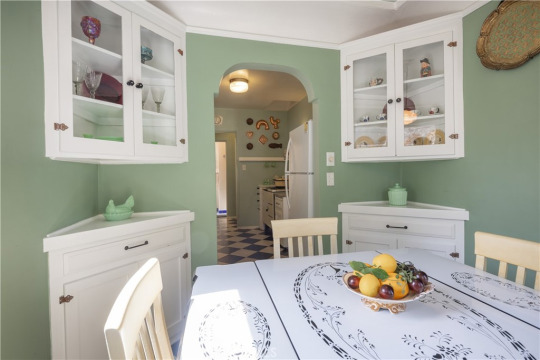
And, look, it has 2 corner cabinets.

Check this out- not only does it have a folding ironing board, but it has a little board for sleeves.
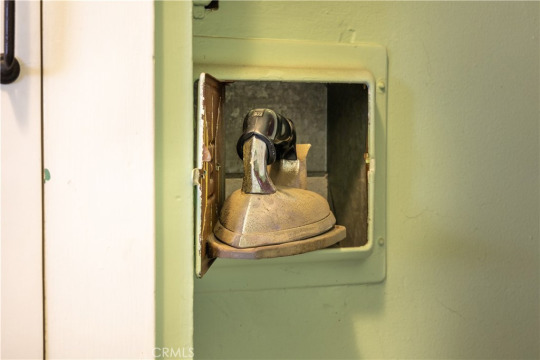
And, look at this- a little galvanized metal lined cabinet for the iron. I wonder if the vintage iron will convey.

TV room. (Could they have chosen more uncomfortable chairs?)
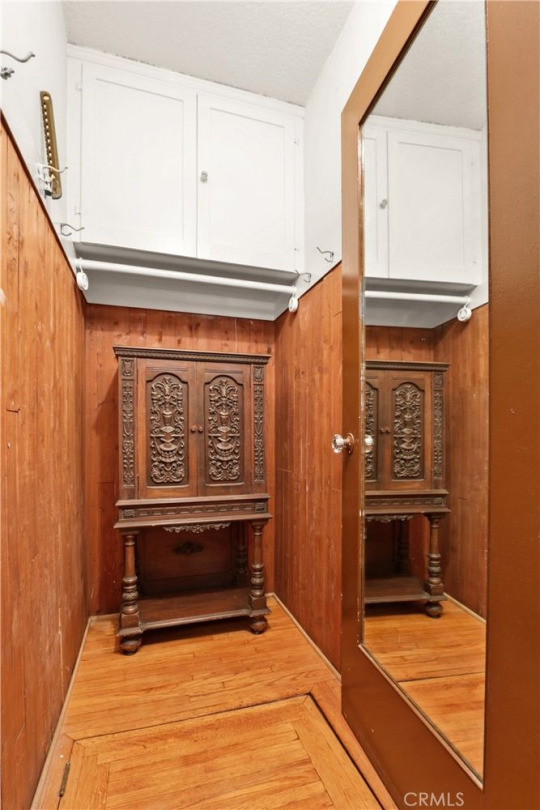
Now, here we are in a closet.

A trap door in the floor opens to the basement. Since I only see one step, it must have a ladder.

This bedroom is lovely, but it's not very big since they have the bed on an angle.

The bath! It has a big built-in vanity table.

And, orchid plumbing fixtures. I've seen vintage colored sinks and tubs, but they always have a new white toilet. They may have gotten this toilet from an architectural salvage yard.
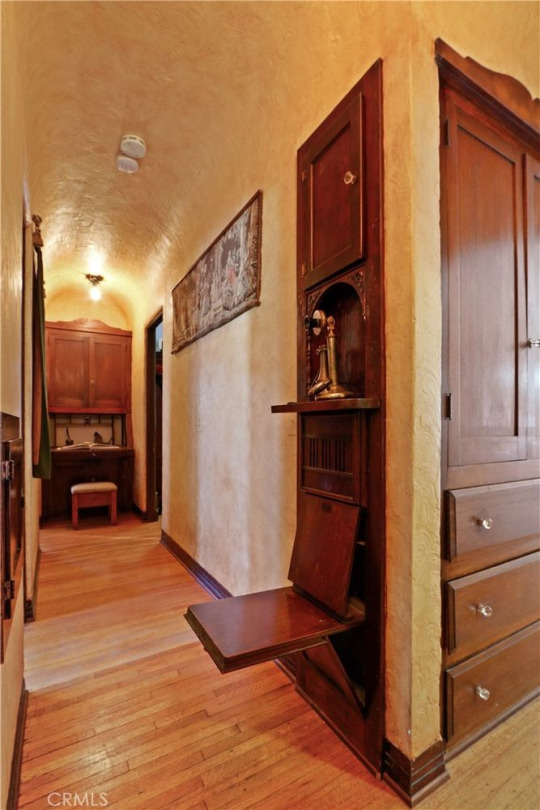
In the hall, ahead, there's a built-in desk. On the left is a built-in armoire. And, there's also a phone niche with a folding seat.
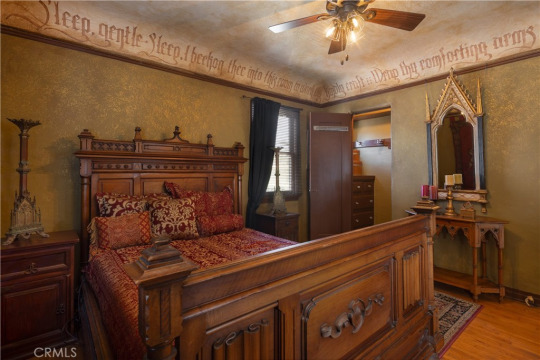

The primary bedroom is so royal looking. It looks like Old English around the ceiling border. And, look at the built-in with the pull-out mirrors.

Beautiful vintage shower room.

This home is amazing- gated driveway with porte cochere and 2 car garage.

In the large yard is an addition.
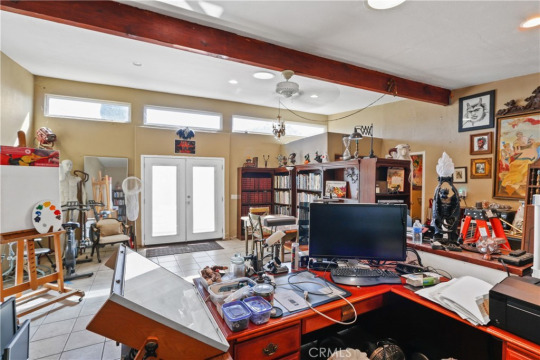
It's a large addition and has this great studio, plus 2 other big rooms that use for storage.
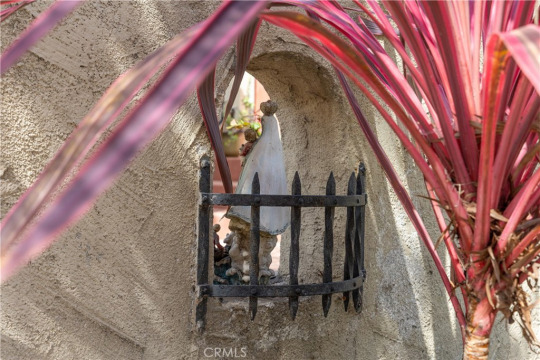
And, look at this detail in the wall outside- a little gnome niche.
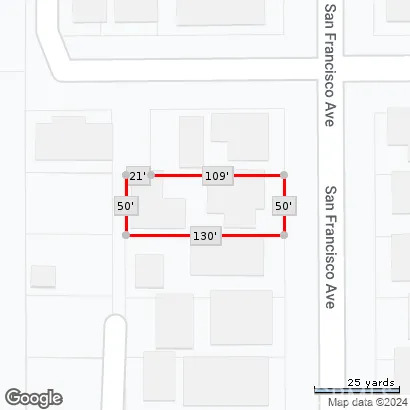
The lot is .15 acre.
https://www.compass.com/listing/1985-san-francisco-avenue-long-beach-ca-90806/1532701137276580849/
168 notes
·
View notes
Text
you are in the earth of me [02]
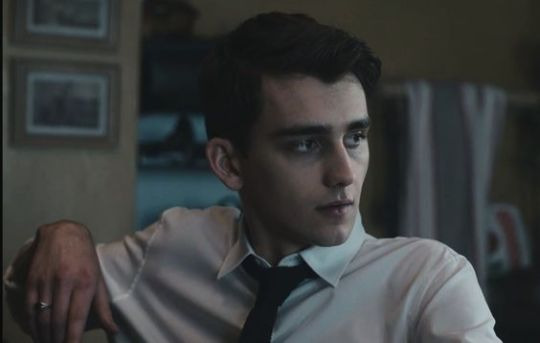
Pairing: Anthony Lockwood x fem!Reader
Content: canon-typical violene, patching up Reader, author pining for Lockwood
Summary: Your eyes pop open. Lockwood is standing at the bottom of the stairs, leaning against the banister with his arms crossed, an amused look on his face. All tousled dark hair and brown eyes as sharp as glass, he is as tall as Kipps, perhaps taller, and lankier. But their demeanours are quite different. Where Kipps is calm and steady like stone, reliable like the earth that is always solid under your feet, Lockwood seems striking like a flash of bright lightning—quick-witted and assured in the path he carves as though the mere thought of something standing in his way is so far-off that he just barrels ahead with no regard of what he sets ablaze.
Notes: [01] | [03]
Words: 7.3k
A/N: Nothing could have prepared me for the overwhelming positive feedback I got for chapter 01!! Thank you so much for everyone who's joined the ride. I hope you guys will enjoy this as much as I!! (I'm on my 4th rewarch of Lockwood & Co. and I still delight in noticing all the small details they put into the show. Also. Lockwood's voice! Makes! Me! Weak!

02: for whom the bell tolls
each man’s death diminishes me, for i am involved in mankind. therefore, send not to know for whom the bell tolls, it tolls for thee
— John Donne
The Rotwell dormitory you live in, nicknamed the Lions Den, is a stocky brick house taking up a good chunk of Dovehouse Street. There used to be a hotel there, way before the Problem, and then an apartment complex for the rich elderly until Rotwell bought the whole building and its private gardens just to prove they can. Echoing the classical Georgian townhouses of Chelsea built out of pale toast and earthy red shades of brick, every residence features timber-panelled walls, triple-glazed windows, and smoked oak floors throughout.
The front entrance has glass doors sliding open for anyone entering. Somehow, the foyer always smells like pine needle polisher. To the right side is a row of mail boxes with each tenant’s name, on the left side is the guard’s office, separated from the foyer by sleek glass panels. Someone decided to put a whole rainforest inside, monstera, rubber trees, philodendrons. They nearly swallow tonight’s agent covering the shift: a bulky, young girl with dark curls to her chin looking like a malformed porcelain doll—delicate features on top, sinewy muscle stretching the seams of her wine red agent jacket going down. She stares at you for a moment, blinking with her long black eyelashes.
You wave.
She doesn’t wave back, and returns to painting her nails a vibrant yellow you could pick out from space.
Inside your mail box, you find ads and unpaid bills, reminders to pay said bills, and a very unflattering drawing of you working out in the dormitory’s underground gym area. You crumble the note and throw it back inside, slamming the window shut.
Your two-room apartment lies at the end of a long corridor, facing the backside and gardens. It is a copy paste of all other living complexes inside this building: a small entrance leading into a spacious living area with a cream-coloured two-seater couch at its centre, a solid cherrywood desk next to the curtained window and a heavy antique armoire twice your size pushed against the wall. Behind an ornate cedar door is the small bedroom, king-sized bed and heavy bureau and all that makes it look more like a hotel room advert than a place where you could wind down after a hard day.
As always, you stand in the hallway for a moment before turning the lights on. It is quiet, the room smells of polished wood and washed laundry. As always, it feels as though the walls are closing in.
You flick the light on and stash your rapier inside the umbrella rack by the front door, ignoring the two trash bags waiting to be thrown out. The laundry has been hanging for three days, but there was just no time to clean it away because you’re barely here—every minute spend within these walls is taken up by sleeping, eating or occasionally staring bleary-eyed at the ceiling and counting the heavy thuds from above whenever the agent living in the upper apartment decides it is time to practice tango in high heels at three in the morning.
You cross the room and open the window, letting in the cool night breeze. The smell of dawn hangs in the air, crispy and cold like the crackling of dry leaves. It will take only a few more hours for the sun to rise and draw London’s people from their homes to go about their daily lives. Jobs, grocery runs, late afternoon dates, strolls through the parks. When the world wakes up, you turn in to sleep, bloody, beaten and bruised, but alive.
You wonder if every day will be like this. Fight against the Problem and only chip away at the immeasurable scale of its extent. This night, you have secured two Sources, stopped two hauntings. But how does this affect the grand scheme of things?
Your head hurts. Best to leave the existential crisis for another day; right now all you need is your soft pillow and the familiar smell of your lavender-detergent. The Problem will still be there once you wake up; it will not ruin those precious hours asleep where you don’t have to worry about anything.
Every apartment has a tiny kitchen and bath adjacent to the living area. A cup of tea before you turn in, and maybe one or two of those chocolate chip biscuit a client gave you last week in appreciation for driving off the Lurker in her basement.
The kitchen looks just like you left it: as though a salt bomb has gone off. There was no time to put away the dishes or give the pan a quick scrub before you left for your shift, and now the leftover burnt bits stick to the dark surface. The half-full cup of coffee has grown cold since the morning, left forgotten. You’re too tired to clean up. It’ll have to wait until you wake up, or maybe even after the next shift.
You consider throwing your head back and screaming for a second when all of a sudden an intense hate for this apartment geysers up and threatens to swallow you. It is tiny, suffocating. There is nothing personal about this—you could disappear from the world and it would just become someone else’s responsibility and property. Nothing would indicate that you left a mark in this place.
Putting the kettle on the stove, you pick out your favourite mug with a broken handle—Kipps’s fault when he knocked it off the table a couple months back—and return to the living room. Your coat smells of burnt fabric from ectoplasm. The agency is very strict when it comes to appearance and representing Rotwell's splendid work ethic, so replacing it will put another dent in your account, but that is still better than going through the same trouble as last month when you appeared with a chocolate smudge on your jacket and every supervisor spotting you gave you hell for it.
Half-shrugged out of your coat, you walk back, past the closed window.
And stop.
Slowly, you turn. Only your own reflection stares back at you—wide-eyed and dishevelled from today. There’s a dark patch on your shoulder where ectoplasm has eaten like acid through the fabric of your coat. The lock is latched firmly on the inside, the metal clip winking at you under the Tiffany lamp’s reflection. Suddenly, everything depends on how still you are against the moving world.
Where did you leave your rapier? Ah, inside the umbrella rack back in the hallway. What’s the closest bludgeon weapon you can get your hands on? Only an empty Pringles can, yesterday’s dinner.
In the window’s reflection, the dark patch on your shoulder rises, distorts. Grows a head. Even with the room plunged into silence, your heart beats rabbit-fast and you hold your breath to keep from making a sound. Just this once, you’re thankful you were running late this morning and didn’t have time to clean up the leftover breakfast on your office desk that stands against the wall. Not even five steps separate you from the blunt silver knife glinting under the lamp with specks of dried jam on its blade.
The shadow behind you grows bulky shoulders and broad arms. When it steps onto the small area just a little to the right from the entrance, the wood creaks.
The world jerks back into motion.
You lunge for the knife on the table when a hard body slams into yours. You crash against the wardrobe, your head hitting the hard wood with a loud crack. The room spins as all air is knocked out of your lungs. You notice a blurry shadow rising in front of you, and your body moves on autopilot—rolls to the right and falls to the ground just in time to dodge a fist punching a hole into the wardrobe.
Nauseating headache throbs like lightning flashes in the back of your head as you scramble back to your feet, wheezing from the pain spreading through your body from the impact. Your rapier. You need your rapier.
Wood splinters when your attacker draws his hand back. He is almost two heads taller than you, completely clad in black. Even his face hides behind a ski mask. All you see are two pinpricks of unfathomably dark eyes as though this man has gazed into an abyss and the abyss has gazed right back at him.
He doesn’t move for a second, stands as though frozen on the spot. Only his hand flexes, relaxes. Clenches. Silver glints off his gloved knuckles. He is here with one intention only: to hurt you.
You don’t have time to ask why. His legs are longer; he closes the distance between you with two long steps, swings his arm towards your face. You spin and fling yourself over the backrest of the sofa, bounce off its cushions and jump to your feet on the other side. With furniture between you and the intruder, you finally force yourself to take in deep breaths. Think.
The smell coming off of him. You recognise it. Grainy, woody with a fruity note. The sweetness you picked up earlier this night must have been caramel. Alcohol.
“Look, if this is about me bumping into your table earlier at the Green Goose, you could just ask for a proper apology,” you press out between gritted teeth. Your whole body feels like a giant bruise, sore and laden from exhaustion.
Every step he takes around the couch, you mirror until it becomes a dance of bodies and mind to see who gives in first; who slows down and loses focus.
At first you believe the noise to be your frantic breathing—or his rattling wheeze, but then you pick it up. A rough, scratchy voice.
“Dickey … need … dickey …”
Your muscles are so taut you fear they might snap any second. Another circle around your couch you go. “What? I don’t—I don’t know what that is.”
“The … the key,” he repeats, louder this time. “I need the key.”
“Key? What key?” You feel the gnawing urge to squeeze your eyes shut against the vertigo of this situation. “I don’t have a key—”
The memory flies back so fast it nearly knocks you out like an incoming brick. Bronze, small, resting within the cushions of a small seal. Disappearing into the deep pockets of a black coat. The echo of death and violence still sticking to your fingers even through the fabric of your gloves.
You round the couch again and stop, the desk at your back. The knife is just in reach. “I don’t have that key.”
“I saw it. He gave it to you. You have no idea how important it is to us.” His voice rises to a snarl, the quality rougher than satin scratching over bark.
“He never gave—” Another memory hurtles your way—it is a wonder you don’t pass out from a concussion. The candy. It is still inside your pocket, suddenly heavier than a stone.
Everything makes sense now.
You take a step back towards the table. “You’ve got it all wrong,” you say, your words tumbling over themselves in their haste to get out, “I don’t have the key, and I don’t know where it is. I’ve got nothing to do with it.”
“LIES!” he hollers, and punches the backrest of your couch. The loud thud is like a gunshut, and you move, whirl around and grab for the knife—and completely misjudge where it is. Instead, your hand slaps on the dirty plate.
It could be worse.
Heavy steps thump behind you. You grab the plate, turn and hurl it at the man. It slams into him, shattering into thousand pieces.
You fly past him, towards the hallway and umbrella rack where your rapier is waiting. Stretching your hand out, your fingers brush against the silver handle—
A hard grip catches the end of your trenchcoat, yanking you back. The blow comes out of nowhere, slamming into your face so hard you see stars. Your back teeth clang together. Black dots dance before your eyes and blur your vision as pain radiates from your cheek. Something sharp and hard slides across your knees, slicing the fabric of your jeans clean in half.
Fingers curling, tightening their hold around the familiar hilt, you turn and draw back your arm, and let it snap forward like a snake lashing out and sinking its venomous teeth into its prey.
The silver-tipped edge of your rapier drives into the man’s shoulder and he cries out in pain, staggers back—and takes your rapier with him. He curls his gloved fingers around the thin blade and yanks the tip out of his shoulder, throwing your weapon to the ground where it lies useless and completely out of reach.
He reaches into a side pocket and draws a jagged, razor-sharp knife.
On second thought, maybe you should just run.
You bolt for the hallway once more, this time aiming straight for the door. The sound of a fast-moving object sailing towards you—something moving quickly and swiftly and with enough force to slice the air in half—makes you throw yourself forward, just in time to dodge the glinting edge nipping your hair.
You yank at the handle, letting white light spill into the apartment from the outside hallway.
Two thinks happen at once.
You wrench the door open and squeeze through the narrow gab. The man behind you slams bodily into the door and you hear a pained groan. At the same time, something sharp cuts through your trenchcoat and jacket. Searing-hot pain explodes in your left side.
You manage to push through and shut the door with a loud slam. A second bang shakes the door; he must have run into it again trying to chase after you.
Hot pain radiates from your side. You grit your teeth hard enough your jaw hurts and follow along the hallway all the way back to the foyer.
When you reach the night guard’s office, there is nobody inside. As if this night couldn’t turn even worse. A small glass bottle lies disturbed on the table, spreading yellow nail polish like spilt blood on its surface. The girl must have knocked it over, now gone to fetch a cleaner.
Great.
You throw yourself under the table and disappear from sight; somewhere on the first floor a door slams shut.
There has to be a way out. A way to draw attention; a way to drive him away. As your eyes rake across the room to find something, anything, they land on a red button behind a small glass window. The ghost-alarm in case of hauntings inside the dorms.
You crawl out from under the desk and scurry across the room, heart beating in your throat. If you turn and he is behind you …
Slamming your fist into the small panel, the button gives away without any resistance.
Sirens blare in the building. More doors slam—opening this time as hundred agents emerge from their rooms. Voices echo from the hallways, drowned by the sprinklers going off and raining salt from the ceiling like little diamonds.
You back into a corner, wide eyes staring at the foyer and counting down the seconds until your attacker enters—any moment, any moment, any moment. Only agents begin to spill into the hall, pale faced, groggy from being rudely awakened after tiring shifts.
With the imminent threat gone, the adrenaline pumping through your body slowly ebbs away—leaving behind bone-deep exhaustion, and mind-numbing pain as though your whole body is one giant bruise.
Your clothes stick to your skin, something warm tickles down your side. You cross the room on wobbling feet, forcing yourself not to look; convincing yourself that it is just coffee, just like a few hours ago when you sat in the booth next to Kipps.
The phone receiver on a corner stand is heavier than you remember. Your fingers move as if possessed, finding the familiar numbers on the dial. It rings. Once, twice.
Tears prick in the back of your eyes as it keeps ringing, your call remaining unanswered. Maybe he hasn’t come home yet. Maybe he is still out. Your throat is dry. You feel like an animal trapped against a corner. Suddenly, everything goes blurry.
Click. Kipps’s tired groan is all you get for a hello.
“Quill,” you choke out. Because despite having to call DEPRAC or maybe an ambulance, Quill Kipps will always be the first you turn to in moments of crisis. “Quill, I might have been stabbed.”
Silence. On the other line, you hear fabric rustling, as though he is crawling out of bed.
“What,” Kipps says, his voice rough from sleep, “the fuck.”
You still don’t know what is so special about the address Kipps has sent you to compared to the hospital or Scotland Yard where you assume they are more qualified to handle your dilemma, but you hope that you arrive soon because the daggers the cab driver keeps throwing at you seem more lethal than the gashing wound in your side.
When he finally stops the car—abruptly enough to launch your body against the frontseat—you rummage through your pockets and empty them completely, leaving a generous tip for bleeding on his car seats.
You barely manage to close the door behind you when he speeds off, leaving a dust trail behind.
The sky is turning cotton pink on the horizon. Dawn spreads light and hope across the city, bright and clear, and very painful for your strained, exhausted eyes. You turn away, taking in your surroundings.
The cab has left you in a residential area at the centre of London where the Victorian semis look like they might belong on old postcards from better times, before the Problem. 35 Portland Row is an inconspicuous, four-level house at the very end of the street. Just like its neighbours, it would not suffer from a new repaint, or maybe just a good clean-up.
A lone shadow sits by the stairs leading into the building, rising when you approach. Kipps looks like you feel: his hair sticks out in all directions and there are half-moons of shadow under his eyes, as if they have been smudged there with coal. He rubs the back of his neck as though that would release all the tension from the last twenty-four hours. Worry is etched deep into his face—worry and guilt, and it is an expression you haven’t seen in a long time. It makes your heart clench, turning it into something small, hard, and cold.
He meets you halfway and catches you when you stumble into him, allowing yourself to be held at last. His hold on you is strong and hard, until you hiss when sharp pain from your wound makes it hard to walk. Kipps’s hold lightens.
“What the hell happened?” he demands, his long fingers gently nudging your head left and right by your chin. You’re pretty sure there is a nasty bruise blooming from the punch.
“Turns out someone out there really wants that bloody key,” you say, unable to put quite the heat into the words like you wanted.
The effect is pretty much the same.
It is like a door slamming shut; his expression closes off completely. He puts your arm around his shoulders and hauls you up the stairs. To your surprise, the door is already unlocked and swings open when he pushes against it with his other shoulder.
You enter into a narrow, dark hallway, only illuminated by light streaming into it from an adjacent room. The house smells of iron and salt, leather coats, and a curious dusty, musty tang. On both sides of the walls hang weird masks and odd curios on shelves. Everything about this entrance screams extravagance, but also something inexplicably homely. The complete opposite from your apartment. Voices sound from the first door to your right, silencing upon the front door clicking shut behind you. Now everything is dead silent.
Kipps leads you past an old, chipped plant pot that functions as an umbrella stand and rapier holder. They are old French models with specks of ectoplasm stuck to blades, and dents in the hilts. One long, black umbrella is bent in the middle as though someone had used it as a weapon and didn’t get around to throw it away.
You emerge into a small, cluttered living area containing a fireplace, an old sofa and a few sturdy armchairs grouped around a coffee table. Heavy dark curtains obscure half of the window where the first streaks of sunlight steal through the gap, showing dust dance in the light.
Three heads swivel your way, all in different states of confusion. You recognise one face.
Anthony Lockwood jumps out of his armchair. It has only been a few hours since you last saw him, and so far he has only taken off his black coat. His white shirt is wrinkled, his black tie thrown over his shoulder. There is something restless about him, like a moth fluttering from flame to flame.
Kipps slides you into the free seat on the sofa right next to a giant pile of crumpled ironing. Shirts, pants, and briefs tumble to the ground as you finally allow yourself to slump into the seat and let your guard down.
The room tilts for a moment. You close your eyes, trying to comprehend today’s events. Multiple voices bombard you from all directions and turn into a pounding headache at the back of your skull.
A metal lid clicks open. Careful hands remove your coat, then lift your shirt where the blood has seeped into the fabric, making it stick to your gashed skin. When your eyes flutter open, Kipps kneels before you on the rug, a deep worry crease slicing through his forehead as he inspects your wound.
“Well, good news. It’s not that deep,” he observes. With swift fingers, calloused from handling rapier and tools, he takes the antiseptic and a clean wipe from the first-aid case—expert hands that are used to medical attention; that know the dance of patching up wounds and tending to injuries. You doubt it is something any agent will forget, even when they have served their duty.
When he applies the disinfect after cleaning the blood, you hiss; your body tenses from the pain. “Cool. I’ll thank him next time I see him,” you say through gritted teeth.
Kipps gives you a curt, quick look—but there is still some relief; relief that even now you can be snippy.
“Did you see his face? What did he look like?” Loockwood asks. He’s leaning over the back of the couch, hand holding onto the backrest hard enough his knuckles turn white.
“I don’t know, I was busy trying not go get turned into a shish kebab.” You kick at Kipps when he dabs the gauze a little too hard into your wound.
“Stop moving,” he warns.
“That didn’t work out much,” a girl’s voice notices drily.
You open your eyes. Behind Lockwood’s shoulder, two agents stare at you, blinking their wide eyes like owls.
The boy’s nose twitches. “She bled on the new rug, Lockwood.”
You feel like an exhibit in a museum. Lucy Carlyle and George Karim. Names only familiar to you because you can’t remember a day where Kipps has not complained about them as much as about Lockwood.
“Yeah, why exactly—am I here?” You shift in the seat. Something is poking you in the back. When you pat the cushion, you find an old, dry biscuit.
Behind Lockwood, Lucy gives George a long, pointed look. Seems like this isn’t the first time they witness someone finding leftover snacks in the crevices of their couch.
“You said he was looking for the key?” Kipps is applying gauze to your clean wound which makes everything just a little better; you begin to feel like a human again. Now all you need is a good, healthy amount of sleep. Preferable for the next three days.
“He thought I had it on me. Said something about … how important it was to them.”
Lockwood perks up. “Who is them?”
“Well, he didn’t give me a list or anything.” You pull out some stray socks from under your bum and let them join their siblings on the ground. Slumping into your seat, you notice it is quite comfortable. You’re sinking into the cushions and there is something calming about the smell of old wood and the heavy curtain’s detergent. “But he was desperate. It seemed like … I don’t know. He’ll be in serious trouble without it.”
“Well, good thing it’s with DEPRAC now,” Kipps says, settling back on his heels after he finishes bandaging you up. The silence hanging in the room is stifling. Kipps looks over the backrest of the sofa at Lockwood. “You did bring it to DEPRAC like we agreed to. Right, Lockwood?”
Slowly, Lockwood leans away from the sofa as though that is the only appropriate measure to take in case Kipps decides to hurl himself over the sofa and strangle him. He has the good manners to look almost contrite. “I might have missed out on the chance to deliver it to Inspector Barnes,” he says slowly. His face is calm and betrays nothing, like the blank statue of a saint in a cathedral.
Kipps is on his feet in an instant. Red patches of rage have broken out over his face and throat. “You lying, conniving piece of—”
Lockwood claps his hands loudly. “This just proves that we cannot let anyone except professionals handle this case. Least of all DEPRAC. Someone’s after it because they know whatever that key unlocks is important.”
“Or he was the Visitor’s killer and he knows it could be evidence,” George points out. “Like Annabelle Ward and Fairfa—”
Lucy slaps her hand over her coworker’s mouth. Her wide eyes stare at him, then pin you down. George blinks, then nods slowly.
You raise your hand. “You know, being the one who got stabbed over this, I veto you let the adults handle it.”
Lockwood gives you a dazzling smile. “Overruled.”
“Let’s sleep on it first,” Lucy says, rubbing the exhaustion from her eyes with her sleeve. “We’ll decide what to do next when we wake up. And yes, leaving it with DEPRAC is still an option.” She looks over at Lockwood, her eyebrows raised. You can’t think of many who manages to make a proposition sound like a threat.
“First reasonable thing I hear any of you say today,” Kipps scoffs. There is still anger in his voice, but you don’t think it is directed at anyone specific this time. This anger smells of frustration. It stems from knowing days like these are in the fine print of becoming an agent. The danger from having to deal with the living from time to time, which can be so much more dangerous than the dead. He turns to you. “Let me drop you off at a hotel.”
“I—” You don’t want to be alone, not after tonight. But Kipps also lives in the Fittes dormitories and they are mercilessly strict when it comes to non-employed visitors, despite being a senior supervisor like Kipps who enjoys some privileges.
“We must assume whoever attacked you might be out there still tracking you,” Lockwood says, and leans forward to settle his elbows against the backrest. His white shit stretches taut over his shoulders and back, catches over his spine. He lowers his dark eyes to you, within which swims a quiet, but solid confidence as though he has never faced a situation he couldn’t handle. It makes you want to rely on him, a thought you quickly push away the moment it steps into your mind. “We have a spare couch in the library you can crash on until morning—” He glances over his shoulder towards the window where sunlight peaks through the heavy curtains. An almost coy smile captures his lips, showing the hint of a dimple. “Until we wake up.”
You raise both eyebrows. “I can?”
Both Lucy and George give Lockwood the sideye. “She can?”
Lockwood frowns. “Unless you have somewhere else to go?”
“A couch sounds perfect.” You are tired enough you wouldn’t mind sleeping on the floor. You throw Kipps a quick look. He doesn’t look happy, but even he realises this is better than leaving you all by yourself.
With nobody objecting, George heaves a defeated sigh. “Let me go and pick up the empty chips bags,” he says, and shuffles out of the room. You hear wood creak when he stalks down the hallway.
When you tear your eyes away from where he left through the door, you notice Lucy keeps staring at you with an odd look you can’t place. As though she doesn’t really know what to think of you and why you are suddenly here, only 'here' doesn't seem to apply to the living room of her home. It feels like she doesn't seem to know why you have suddenly stepped into her life. She manoeuvres around Lockwood, painstakingly making sure there’s furniture between you and her.
Kipps is by your side helping you up. He follows Lockwood's directions through the entrance hall. You pass the stairs to the end of the hallway where George is carrying an armful of empty bottles and plastic bags out of what you assume must be the library.
It is a small, oak-panelled room across the hall from the lounge. No light sneaks inside with the heavy curtains shrouding the windows. Up to the ceilings, hardback volumes are crammed into black, heavy shelves that line all four walls. It smells of books and ink and printed paper, making you immediately feel at ease under the dim, warm light of an old standard lamp tucked into a corner.
Kipps makes sure you’re comfortable on the leather couch, throwing a worn, chequered wool blanket over your legs. He looks at you for a long moment. Then he seems to crumple inside, like paper; he sinks down in the leather chair opposite you, and puts his face into his hands. “I should have just told Lockwood No when he asked for someone with Touch. I never wanted you to get involved like this.”
“It’s a little too late for that now, isn’t it?” you state, but there is no malice or accusation in your voice. You are too tired for that.
Still, Kipps makes a sound like a kicked puppy. When you look over at him, you see him pale and slumped down, like someone who’s taken so many blows that the doesn’t want to stand anymore.
Your grab for his hand and squeeze until he returns your gaze. His pale green eyes look haunted. “I don’t think this is anyone’s fault,” you say. “Least of all yours.”
Kipps purses his lips. You squeeze his hand tighter.
“Maybe,” he allows. He scrubs at his face, eyes flitting over the hardcover books surrounding him. You grow drowsy with every steady ticking of an ornate mantel clock above the fireplace. To your side is a small, mahogany Victorian pedestal table with a leftover cup next to a stack of London Society magazines. “Or maybe I should have been more careful,” he continues. “Be more careful. So this doesn’t happen again.”
The fog of sleep that almost takes you is cleanly cut by his words. You blink against the dizzy feeling that tries to pull you under; dragging you down like wet clothes when you swim. You let go of his hand and sit up. “You are not responsible for me,” you say, unable to keep the heat out of your voice now. It comes back full force, scathing and blazing. “I can look after myself perfectly fine, and I would not have you waste your life away because you think you are obliged to protect me.”
“You could barely fend off that attacker by yourself,” he shoots back—his voice strains to remain diplomatic, calm, but this is Quill Kipps, and he has never been capable of putting the lid on the smouldering fire when it comes to your safety. “I made a promise and I mean to keep it until you’re retired and old and stop getting into danger—”
The rage that always lives inside you rears when he says that ugly word—promise. It is an almost physical pain, like nails against flesh.
“You are not my brother,” you snap. “And I don’t want you to be!”
All colour drains from Kipps’s face, then comes back in a rush of angry red as he tries to keep his anger under control. You know a lot about rage. How hard it could be to rein it in without a lifetime of practice. How it could eat you up inside.
He stands, slowly, calmly—and that is so much worse than when he explodes. This is him in his upset mood that you call ‘scary-calm.’ It is a calm that makes you think of the deceptive hard sheen of ice before it cracks under your weight.
“Quill—” you begin, but he is already moving towards the door.
“If I were Matthew,” he says at the threshold, not looking at you, “I would actually be able to protect you.”
It is a blow not meant to be a blow, and yet it drives through your chest like a poison-tipped spear. It stirs up age-old dust from a past you try to bury so hard that now you choke on it.
Matthew. Mat. Mat is gone because of you. And now Quill leaves you too.
You jump to your feet, ignoring the piercing pain in your side and stumble after him. Kipps disappears down the hall, then you hear the front door open, and slam shut.
You close your eyes and bang your head silently against the doorframe. Beneath your gloves your palms are slick with sweat and your fingers shaking. All day you felt like walking on a tightrope, and now a single misplaced step sends you plunging. You have never felt this alone before.
“Do you do that because you enjoy it, or because it feels good when you stop?” says a drawling voice from the corridor outside.
Your eyes pop open. Lockwood is standing at the bottom of the stairs, leaning against the banister with his arms crossed, an amused look on his face. All tousled dark hair and brown eyes as sharp as glass, he is as tall as Kipps, perhaps taller, and lankier. But their presences are quite different. Where Kipps is calm and steady like stone, reliable like the earth that is always solid under your feet, Lockwood seems bright like a flash of lightning—quick-witted, assured in the path he carves as though the mere thought of something standing in his way is so far-off, he just barrels ahead with no regard of what he sets ablaze.
Any retort dies on your lips when he throws something your away, and you catch the first object mid-air, pulling a face when your wound protests. It is cold and heavy—a pack of ice cubes wrapped in a towel. The second thing hits you in the shoulder and clatters to the ground. A package of painkillers. If you would look up the word Oops in the dictionary, you’ll find a picture of Lockwood’s current expression.
You bring the ice pack up and press it against your cheek. “Thanks.”
Lockwood gives a crooked smile. “Plenty of time to figure everything out later. If you need anything, our rooms are just another floor up.”
Your mouth is dry. He isn’t nice because he wants to; he too does it out of an obligation. “OK. Thanks.”
He crams his hands into his pockets, eyes raking from your feet up to your face. It seems as though there is something else Lockwood wants to say, but he decides otherwise and ends up simply nodding before he ducks back towards the kitchen where you can hear the hushed, urgent voices of Lucy and George.
You retreat into the library and shut the door gently. Only the clock’s ticking fills the room now, so loud it is almost grating against your ears. You tug your gloves off gingerly and place them next to the magazines. The skin on your knuckles and the back of your hand is dry like sandpaper. Later this evening, you have to make sure to get your hand lotion.
Ignoring the unpleasant feeling, you lie down and shimmy under the blanket. You tug your hands close to your chest where there is no danger to accidentally touching anything—you know there is no threat from objects belonging to the living, but after almost a decade of experiencing death echoes ranging from mild joy to severe depression, it is soothing to know that the gloves conjure a sense of separation, of safety. Without them, you feel naked and vulnerable.
Just a few hours of sleep. Then you’ll figure out what to do. Maybe you can pretend the whole day didn’t happen—run a few jobs, clean up your room after the attack. Return to normalcy. Return to your day-to-day life before you got roped into Lockwood & Co.’s business and their wayward modus operandi.
You close your eyes and pretend you don’t feel strangely safe listening to the muffled voices coming from the other room.
Something has taken a hold of your legs.
Your stomach roils with panic as you thrash against its grasp, smelling damp soil and rotten leaves—someone is trying to put you under the ground, bury you alive in unholy ground where all hope and virtue is lost, just like—
You jerk free—
—and fall.
The floor is hard and unyielding, slamming you awake on impact. The pain follows right after, radiating from your side to the rest of your body. Groaning, you try to turn to your other side, but with your legs still half-entangled in the blanket, you don’t make it far.
There was a dream. At least you think there was a dream. You can’t remember much, only the smell of rotten soil and copper.
From under the closed door, you see a slim sliver of late afternoon sun peak into the dark room. You lie very still for a moment, even though your back and neck hurt from being curled up on the small couch all night. It is not the foreign place that startles you, but the noises that belong to a lively home: cabinets open and close. Dishes clatter. Water boils. Voices drift through the walls, muffled but heartily warm and bright. It smells of heated butter, herbal tea, and something burnt.
A home. This is a home where people come to wind down after work, to be vulnerable, to pick up the broken pieces after a case.
For just a minute, you close your eyes and imagine this is your life. Your home. This is your room, smelling of books, ink, and candles. Somewhere downstairs a cup smashes into bits, but there is only laughter, bright and cheerful—someone shouts a jolly “Luce!”
You pop your eyes open; the pipe dream dissipates. Your body is a medley of bruises and aches as you get up. Kipps was right, the cut isn’t too deep, you didn’t even bleed through the gauze during the night. You look at the ornate clock hanging above the fireplace. It is past three o’clock. You have to be at Rotwell’s in an hour.
Blinking against the sting in the back of your eyes, you get up and grab your gloves from the small table and your torn, dirty Coat hanging from a chair’s armrest. The fabric stinks of blood and sweat, but there is no time to get back home and change into clean clothes. You can’t get late to work a second time this week.
Your initial plan to just march through the front door and leave doesn’t work out when you pass the open kitchen door. It is a small, cluttered room with a huge table in its centre like a pillar of strength. Several plates with food have been placed down, breakfast served for three people: boiled eggs in cute little eggcups, sandwiches, a fruit bowl, some hot, greasy sausages just out of the pan. There is flatbread and right beside it a plate with small bites like fruits, walnuts, sliced cucumber and radishes.
The agents of Lockwood & Co. coordinate around each other in a way that seems like a practised dance—Lucy swiftly dodges George carrying a plate with doughnuts while Lockwood steps out of her way striding towards the water kettle without even looking.
When she pauses and says something to him, he does that thing you find annoyingly attractive in men: since he’s much taller than Lucy, Lockwood leans down and tilts his head towards her to hear her better. He has a striking side profile, all sharp lines and elegant curves, a pointed jaw.
You see him smile, and grow increasingly annoyed at how effortlessly handsome he is.
George clears his throat, and then all three are staring at you standing in the doorway.
Lockwood’s mouth twitches into a smile. “Hiya.”
Lucy’s mouth twitches into something that hasn’t decided yet if it wants to be a smile or a scowl.
George notices you looking at the food on the table and promptly says, “We don’t own enough dishes for another person.” He calmly closes the cupboard behind him where you see another stack of plates and cups.
“Wasn’t interested. I’m not much into burnt toast,” you say like a liar. George huffs in offence. “I have to go anyway. Work and all that.”
Three heads nod at the same time, a conjoined Hydra.
Remembering you have something like manners, you quickly add, “And thanks for letting me stay.” That should be enough pleasantries. You hastily make your escape through the front door and manage two steps downstairs before you hear footsteps behind you.
“One more thing,” Lockwood says, propping himself against the doorfrome. You wonder if he owns any other piece of clothing other than his white shirts and ties. “Regardless however we proceed with our case, it would be to both our benefits to work out an association. There is no harm in having friends in established circles.” He puts on a smile, one you recognise from meeting him for the first time. Charming, but bashful, he plays coy to try and pull you around his little finger.
So this is how he wants to play it.
You slip into your jacket and smooth down the fabric to appear at least somewhat dignified. “We are not friends, Tony,” you say, and notice with some satisfaction the tick in his jaw whenever someone uses that nickname. “And frankly, if our paths don’t cross anytime soon, I wouldn’t mind. Now, if you excuse me—“ well aware of the ectoplasm stink and the tears in your jacket, you push your shoulder blades together— “we at Rotwell are quite busy with actually solving the Problem instead of playing detective games.”
With a confidence you don’t feel at all, you grant Lockwood one of your sly grins, your usual selling argument whenever you’re wearing your Rotwell armour. Lockwood’s face remains impassive. When you turn, heading out to the main street to get a cab, you feel his eyes burying like a dagger into your gut. In the distance, a church bell rings on the quarter hour, and you try and remember the poem about the bell tolling.

A/N: I cheated a little, the Rotwell dormitories are pretty much the Auriens Chelsea apartment complex. I'll upload a masterlist for this sometime this week to keep things a little more organised.
Taglist: @helpmelmao, @simrah1012, @chloejaniceeee, @fox-bee926, @frogserotonin, @obsessed-female, @avelinageorge, @quacksonhq, @wordsarelife, @bilesxbilinskixlahey, @che-che1, @breadbrobin, @anxiousbeech, @charmingpatronus, @starcrossedluvr, @yourunstablegf, @grccies, @sisyphusmymuse
(Just a heads up, if I can't tag you, it might be because of your settings)
#lockwood show#lockwood books#lockwood & co#l&c#lockwood x reader#anthony lockwood#anthony lockwood x reader#lockwood x you#lockwood x y/n#lockwood netflix#lockwood and co#lockwood reader insert#l&c reader insert
211 notes
·
View notes
Text

chapter eight
Three days after her Westruun trip, Keyleth returns home in the evening at the end of a marathon of meetings to find her father waiting outside. This is hardly unusual; Korrin is almost always hovering somewhere near the door, trying not to seem like he’s worrying. Tonight, though, he’s got a funny look on his face, the kind that suggests a conversation needs to be had before going inside. “What’s wrong?”
“Nothing’s wrong,” he says unconvincingly. “It’s not bad. I mean, I don’t think it’s bad.”
“Oh gods.” Keyleth pushes inside, where she’s greeted by the distant, unmistakable sounds of arcane magic from somewhere up above.
“We probably should have asked first!” Korrin calls after her as she scurries as fast as her wobbling legs will take her upstairs. It’s not hard to follow the low bangs and shuffling all the way toward her bedroom, or rather, the room next to it, which she opens hesitantly.
“No, not yet!”
But it’s too late. Keyleth stands in the doorway, staring at Gilmore with a slack jaw. He’s frozen in the middle of the room, the setting sun illuminating him from behind like a halo, his usual purple robes rolled up to the elbow and his beringed fingers waggling in the air as he levitates an ornate rocking chair near the window. He grins sheepishly. “Surprise?”
The room is…transformed. Keyleth’s known for some time now that this is the room she’ll be using for a nursery, given that it’s right next door to her own, but she’s been putting off actually doing anything with it, given the general state of her life. Now, instead of bare walls and a plain wood floor, the room has come alive, with vines climbing up toward the ceiling in swirling patterns and thick, mossy rugs of every shade of green and furniture, which, she admits, is probably important. A crib of white oak and a matching armoire in the corner, each hand-carved with intricate botanical patterns and the symbol of the Ashari—the aforementioned rocking chair, plushly padded and now magically rocking on its own—a pair of raw wood shelves laden with children’s books in several languages, including Celestial, which she has to imagine comes from Percy—a changing table exactly the right height for Keyleth, with a mysterious door in the side—hanging from the ceiling, just above the crib, a delicate mobile of black birds that circle round and round by either mechanical or arcane means, she can’t be sure.
Her throat is instantly thick. The room is beautiful, absolutely stunning, full of life and light and joy. The more her eyes roam around, the more details she spies that nearly take her out at the knees. The stuffed bear in the crib, covered in tiny pink bows. The toy lute tucked among the books. The blanket draped over the back of the rocking chair, embroidered with the sprawling branches of the Sun Tree. A bouquet of snowdrops on a side table in a water jug that looks remarkably like the one Grog liked to eat mayonnaise from. A miniature golden robot, quill in hand, on a shelf. The small wooden raven perched at the head of the crib, its long beak curving down in stoic watch over the bed inside.
Gilmore crosses over and gently hooks his arm in hers to pull her inside. “I didn’t get the chance to catch up while you were in Westruun, but that’s fine, because it gave me the opportunity to do this.”
“Gil…” she chokes out, nose snotty and eyes wet. “It’s…it’s just…”
He pats her arm. “Let me give you a tour.”
continue reading on ao3 please consider donating to my ko-fi
#thanks for coming on this journey with me!#this story ended up being a lot more than i thought it would be when i set out to write it#it took a lot of out of me but i hope you enjoyed it!#critical role#critical role fic#cr fic#my fic#vaxleth#vaxleth fic#vox machine#vox machina fic#isar
28 notes
·
View notes
Text
Zutara Week 2023 - Day 1: Home
Her fingertips brush gently across the smooth carved oak surface of the armoire. Each perfectly chosen chisel stroke contributes to the comforting flow of her room. Her eyes drift through the rest of the space; the woodwork meanders like water, curving, ebbing, and eddying throughout the artistry of each piece of furniture. A wardrobe of similar craft sits next to the window. Thick dark curtains are pulled back to let in the evening’s moonlight. Atop luxurious surfaces live small paintings, snapshots of moments in time. The sight of her father, brother, and grandmother’s images ignite her smile. She lets out a contented sigh as her eyes fall on the final frame, a depiction of her husband and two children in front of a beach house.
A stack of carelessly thrown, yet still organized sun hats rest on the corner chair next to the dressing mirror. A light nightgown hangs from there, perched beside its reflection, discarded until its duty is next called. Her smile diminishes marginally as her eyes pan through the rest of the space, realizing the empty feeling in the room filled with things.
Journeying out from the room, she is surrounded by ornamental purple silks mingled with reds and some blues decorating the walls. Adopting a leisurely pace while traversing the halls, she recalls the recently changed aesthetic. Gone is the darkness and overbearing decoration, in favor of more open space, room to breathe. The hallways are more well-lit and brighter, such a change from the dark overbearing presence the place held when she first arrived.
Stopping before a large set of doors, she thinks back. She’s called many places around the world temporary houses, from the South and North Poles, to the back of Appa, to a house in the upper ring of the Earth Kingdom. She frowns at the lack of permanence any of them held.
Pushing the doors open, she is greeted by streams of cool moonlight filtering through the yet unblossomed fruit trees of the gardens. Walking out toward the glistening pool that houses her husband’s favorite small animal friends, she hears laughter and giggling floating across the garden. The sound is contagious, and she finds herself smiling as she rounds the corner.
The familiar voice of her love calls out to her, “Katara?”
It is followed quickly by excited yelps and screeches as her children cry out “Mom!”
She feels her cheek muscles stretch and begin to hurt as her kids rush over and hug her. She closes her eyes and takes in the feeling, drinking it in as if it would disappear the next moment.
The strong arms of the Fire Lord embrace her as he looks at her questioningly. “Weren’t you supposed to be in Ba Sing Se until next week?”
She gazes back into his golden eyes and leans into his hug. “We finished up business early.” Giving only a momentary pause, she places a loving peck on his lips. “Besides, I missed all of you. I missed this place. I missed home.”
If you like my writing, check out my other works over on AO3!
@zutaraweek
#zutara#zuko x katara#katara#zuko#zutara week 2023#zutaraweek2023#geotheraider writes#zutaraweek#zkweek2023#zkweek
38 notes
·
View notes
Text
Thanks for the tags @frostedlemonwriter and @dyoniawrites!
Writing Share Tag
@kaylinalexanderbooks reminded me that I have this scene of Sepo getting to dress up in fancy clothes, so I'll post that ;)
After a quick wash in the adjoining bathroom, Sepo pulled open the doors of the ivy-carved armoire, sighing bitterly. If he wanted these people’s help, he had to play by their rules. Just think of the power. That’ll make it better.
Looking through the options, Sepo had to begrudgingly admit that the Devarises knew their stuff. The perfectly sized clothes would have been creepy under any other circumstances, but living with a prodigy sorcerer tended to desensitize one to such things. The colors were perfectly suited to his pale complexion and lanky frame, more so than anything he could have afforded back home.
Even if he would never admit to it under anything short of thumbscrews, Sepo sometimes missed the finery he’d once worn. It’d been over a decade since he’d held the position of Singer Priest, yet he still remembered the cool press of his ceremonial mantle with fondness.
The jewelry also, seemed wrought specifically for him. Sepo was bemused to find that all of the pieces featured patterns of crashing waves and blue-black sapphires. Amusing, if a bit insulting.
Shaking himself, he dropped the ring he’d been admiring. There was no time for that! Cursing the Devarises and himself—mostly himself—Sepo raced to make himself presentable, ignoring the allure of the silks and satins around him.
Ok, mostly ignored. Snagging a ring or two wouldn’t hurt anyone. Probably.
He has a shoplifter's soul and a runway model's heart. I'll tag @renja-writes @saturnine-saturneight @pluttskutt @vallkary and anyone else who wants to play!
11 notes
·
View notes